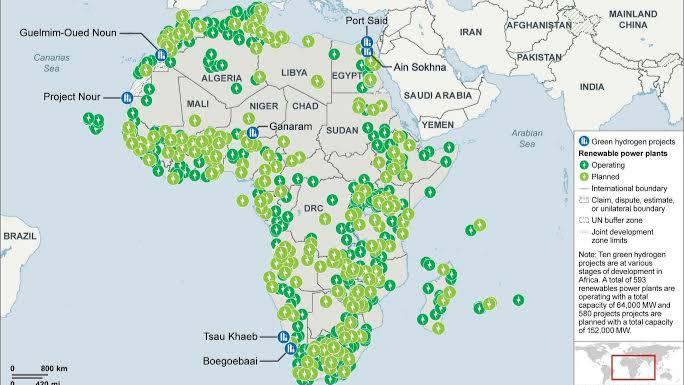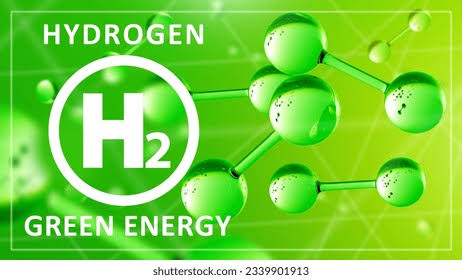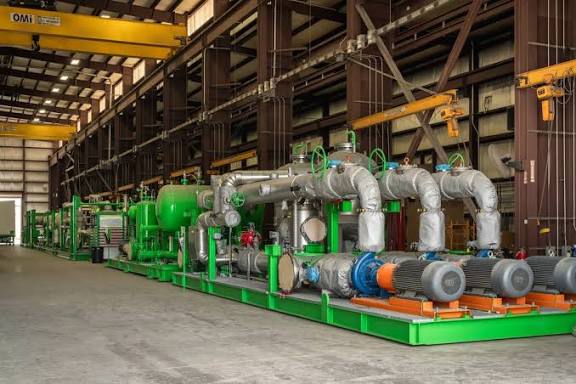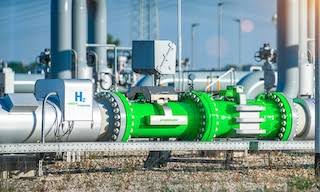The Hydrogen Gold Rush: Can Africa Fuel the World’s Clean Energy Future?

KAROO DESERT, South Africa. Under the relentless sun, an energy revolution is quietly emerging. Across wind-swept coasts, vast deserts, and sun-drenched plateaus, scientists and engineers are pursuing a new kind of gold, one that is neither visible nor tangible. This revolution is driven not by oil or coal but by a single, invisible molecule: Green Hydrogen (GH₂).

For decades, Africa has exported raw commodities like crude oil, copper, cocoa, and cobalt. These exports have fed global industries, but the continent has rarely controlled the entire value chain. Now, as the world moves toward net-zero emissions, Africa is on the verge of a historic transformation. It has the chance to export a manufactured, high-value product, pure, green energy, generated by the sun and wind that have always characterized its landscape.
If successful, Africa could shift from being the world's supplier of raw resources to becoming the center of clean energy innovation.
A Scientific Leap: From Sun to Fuel
At the center of this transformation is a straightforward process called electrolysis. This process uses renewable electricity to split water (H₂O) into hydrogen (H₂) and oxygen (O₂). The captured hydrogen can be stored and transported, becoming a dense, zero-carbon fuel that powers industries, ships, and entire cities.
For years, Green Hydrogen was seen as too costly to scale. The process consumes a great deal of electricity, making it viable only where power is cheap and clean. This is where Africa’s natural advantages come into play.
The deserts of Namibia and Morocco receive some of the highest and most consistent solar energy on Earth. Along the coasts of Mauritania, South Africa, and Egypt, strong and predictable winds blow over thousands of kilometers. Together, these conditions create one of the richest renewable energy regions in the world.
“We have the sun, the wind, and in South Africa, the Platinum Group Metals essential for electrolyser catalysts. This means we can build the entire value chain right here,” says Dr. Zola Mkhize, an energy systems engineer in Cape Town.
With renewable energy costs dropping, African-produced hydrogen could soon achieve the lowest Levelised Cost of Hydrogen (LCOH) globally. This would be a game-changer for countries eager to move away from fossil fuels in transportation, steelmaking, and shipping.
The New Pacesetters: Pioneers in the Desert
Across the continent, multi-billion-dollar projects are shifting from plans to reality, demonstrating Africa’s commitment to securing its place in the global hydrogen race.
Namibia’s Hyphen Project: In the southern desert, the $10 billion Hyphen Green Hydrogen Project is harnessing strong coastal winds to create green ammonia, a form that is easier to store and ship. Its output will support European industries and maritime shipping, making Namibia a key player in the EU’s clean energy imports.
Egypt’s Suez Canal Economic Zone: Egypt is transforming one of the world's busiest waterways into a global clean fuel corridor. By producing green ammonia and e-fuels near the canal, it ensures that ships traveling between Asia and Europe can refuel with zero-emission energy, an impressive move that aligns climate goals with economic strategy.
Morocco and Algeria’s Maghreb Pipeline Ambition: North Africa’s solar belt is serving as the foundation for another ambitious plan—repurposing and extending gas pipelines that used to carry fossil fuels to Europe. Soon, these could transport clean hydrogen, changing the continent’s role in the global energy market.
Kenya and South Africa’s Research Corridors: In Kenya, small-scale hydrogen hubs are being tested with geothermal energy. Meanwhile, South African universities are developing local electrolyser technologies to lessen reliance on imports. This research could position Africa as not just a producer, but also an innovator.
These initiatives are being brought together through the Africa Green Hydrogen Alliance (AGHA), a group of forward-thinking nations coordinating investment, safety standards, and regional infrastructure. The goal is to avoid disjointed progress and build a continent-wide system that scales efficiently.

From Opportunity to Ownership
Green Hydrogen represents more than a technological shift; it offers a chance for economic redefinition. The global hydrogen market, expected to exceed $600 billion by 2050, will require large production sites and reliable export partners. For the first time, Africa can provide both.
However, the opportunity goes beyond exporting. Hydrogen projects need roads, ports, desalination plants, and high-voltage transmission lines. This infrastructure will create local jobs and provide benefits that last beyond the projects themselves. If managed well, these changes could revitalize rural communities and turn them into industrial centers.
Furthermore, the transition is not straightforward. Building a hydrogen economy requires new funding models, stable regulations, and skilled workers. Countries must ensure that foreign investors don’t just extract value as they have done with minerals in the past.
“Hydrogen can’t repeat the mistakes of the oil era,” warns Dr. Adebayo, an energy economist in Lagos, “The same solar and wind farms that power these projects must also supply electricity to local communities. That’s how to transform an export industry into real development.”
The Dual Challenge: Water and Equity
The most pressing technical challenge is water scarcity. Electrolysis needs large amounts of pure water, but many of Africa’s prime hydrogen locations, the Namib, the Karoo, the Sahara are among the driest places on Earth. To address this, scientists are experimenting with renewable-powered desalination plants to ensure that hydrogen production does not deplete local resources.
The second challenge is energy equity; ensuring that hydrogen does not become just another export product disconnected from local needs. Without proper frameworks, extensive solar farms could power Europe’s grid while local villages remain without energy.
The solution is to co-design projects that connect export infrastructure with domestic energy access creating hybrid systems in which the same renewable sources power both electrolysers and national grids. This approach is already being tested in Namibia and Egypt, providing a model for inclusive clean development.
The Global Stakes
Africa’s hydrogen ambitions are not developing in isolation. Around the globe, industrial powerhouses from Germany to Japan are racing to establish long-term hydrogen partnerships. The European Union’s Global Gateway Initiative has already allocated funds to connect African hydrogen corridors to European markets. Meanwhile, Gulf states like Saudi Arabia are positioning themselves as competitors, creating a geopolitical contest for the future of clean fuel supply.
In this competition, Africa’s greatest advantage is its timing. Unlike established economies, the continent is not tied to old energy infrastructure. It can build a clean system from the ground up, powered by renewables and designed for hydrogen, all while aligning with global decarbonization goals.

Africa’s Energy Declaration
Africa’s entry into Green Hydrogen is a declaration of intent for the continent. It signals a future where Africa becomes a hub of innovation rather than just a source of extraction. Here, deserts could transform into laboratories, and sunlight could drive strategic development.
Can Africa control the infrastructure, patents, and profits that determine its value?
If successful, Africa will not only power the world’s clean energy future; it will also change the narrative of who fuels the next industrial age.
Recommended Articles
There are no posts under this category.You may also like...
Be Honest: Are You Actually Funny or Just Loud? Find Your Humour Type

Are you actually funny or just loud? Discover your humour type—from sarcastic to accidental comedian—and learn how your ...
Ndidi's Besiktas Revelation: Why He Chose Turkey Over Man Utd Dreams

Super Eagles midfielder Wilfred Ndidi explained his decision to join Besiktas, citing the club's appealing project, stro...
Tom Hardy Returns! Venom Roars Back to the Big Screen in New Movie!

Two years after its last cinematic outing, Venom is set to return in an animated feature film from Sony Pictures Animati...
Marvel Shakes Up Spider-Verse with Nicolas Cage's Groundbreaking New Series!

Nicolas Cage is set to star as Ben Reilly in the upcoming live-action 'Spider-Noir' series on Prime Video, moving beyond...
Bad Bunny's 'DtMF' Dominates Hot 100 with Chart-Topping Power!

A recent 'Ask Billboard' mailbag delves into Hot 100 chart specifics, featuring Bad Bunny's "DtMF" and Ella Langley's "C...
Shakira Stuns Mexico City with Massive Free Concert Announcement!

Shakira is set to conclude her historic Mexican tour trek with a free concert at Mexico City's iconic Zócalo on March 1,...
Glen Powell Reveals His Unexpected Favorite Christopher Nolan Film

A24's dark comedy "How to Make a Killing" is hitting theaters, starring Glen Powell, Topher Grace, and Jessica Henwick. ...
Wizkid & Pharrell Set New Male Style Standard in Leather and Satin Showdown

Wizkid and Pharrell Williams have sparked widespread speculation with a new, cryptic Instagram post. While the possibili...
